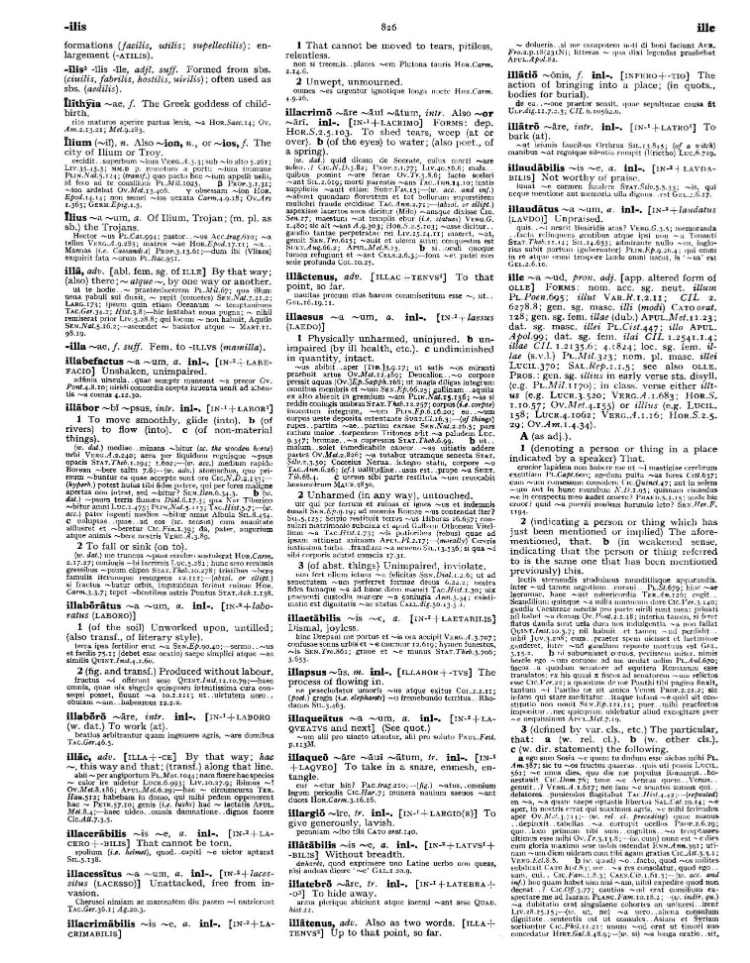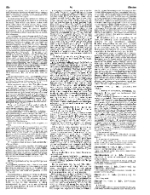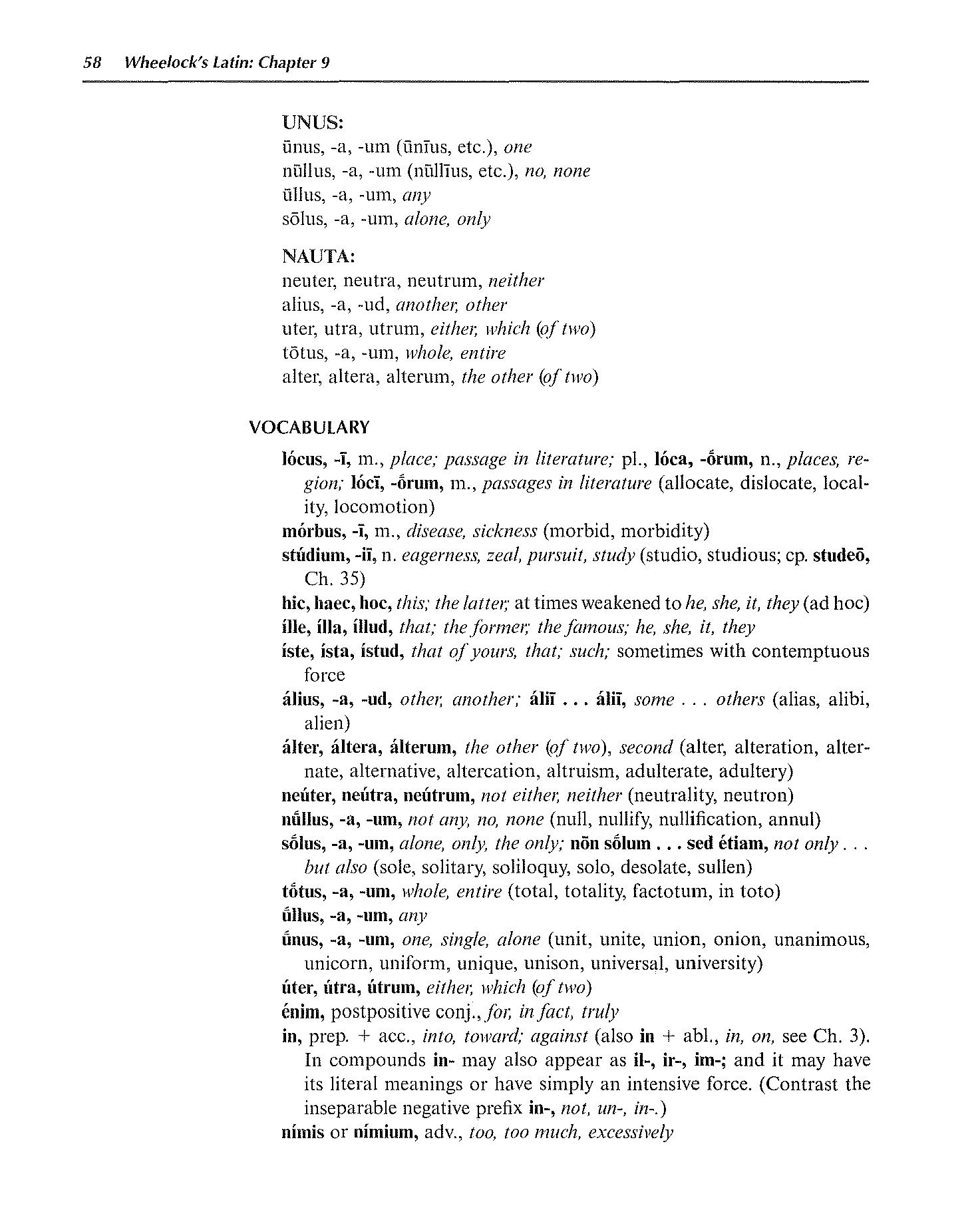
page_listing.tpl
page_subListingDetails.tpl
sub_listingDetails_style1.tpl
sub_listingDetails.title.tpl
ille, illa, illud that
ille, illa, illud is a Latin Pronoun that primarily means that.
Definitions for ille, illa, illud
Wheelock's Latin
Pronoun
- 1
that; the former; the famous; he, she, it, they
Oxford Latin Dictionary
Pronoun
- 1
That (pointed by the speaker) person or thing.
- 2
(indicating a person or thing as already mentioned or implied) The person or thing mentioned, he, she, it, etc. (a) (masc. or fem.). (b) (neut.); ex ~o, from that time on, thenceforth; ~o loci, in that situation. (c) (when accompanied by pred. ~e is usu. attracted into the same gender). (d) (used in indir. sp. in place of the normal se).
Adjective
- 1
(denoting a person or thing in a place indicated by a speaker) That.
- 2
(indicating a person of thing which has just been mentioned or implied). The aforementioned, that. (b) (in weakened sense, indicating that the person or thing referred to is the same one that has been mentioned previously) this.
- 3
(defined by var. cls., etc.) The particular, that: (a) (w. rel. cl.). (b) (w. other cls.). (c) (w. dir. statement) the following.
- 4
(indicating that the person or thing referred to is assumed to be known or known to be such) That which you know; (often with pron. adjs.) that of mine (yours, etc.). (b) (w. a a commendatory connotation) that famous, the well known; (spec., in prayers. applied to Jupiter). (c) (w. a contemptuous or derogatory connotation) that vaunted, the so-called, the infamous.
- 5
(used to express generally what would be indicated by a name in a particular instance) Such and such; hic..an ~e or sim., this..or that.
Sentences with ille, illa, illud
Latin to English
Illud bellum breve erat difficile.Compare That short war was difficult.
Ille miser fugitūrus cōnsilium trium amīcōrum petēbat.Compare That wretched man on the point of fleeing kept seeking the advice of his three friends.
Ille dux putāvit patriam esse sibi cāriōrem quam vītam. Compare That leader thought that his country was dearer to him than life.
Illa rēs pūblica minima maximās spēs habuit.Compare That very small republic had the greatest hopes.
Ille potens sui laetusque deget, cui licet in diem dixisse "vixi: cras vel atra nube polum pater occupato vel sole puro; non tamen irritum, quodcumque retro est, efficiet, neque diffinget infectumque reddet, quod fugies semel hora vixit."Compare He will through life be master of himself and a happy man who from day to day can have said, "I have lived: tomorrow the Sire may fill the sky with black clouds or with cloudless sunshine; he will not undo aught that is left behind me, nor change or make as though it had not been aught that the hour, fast as it flies, has once brought."
O terra ille beatus, qui hic vir excipio: hic ingratus, si ejicio: miser, si amitto!Compare O happy that land which shall receive this man: ungrateful this land, if it shall banish him: wretched, if it shall lose him!
Illa iniusta bella sunt, quae sunt sine causa suscepta, nam extra ulciscendi aut propulsandorum hostium causam bellum geri ustrum nullum potest.Compare Those wars are unjust which are undertaken without provocation. For only a war waged for revenge or defense can be just.
Illud autem erat inclemens, obruendum perenni silentio, quod arcebat docere magistros rhetoricos et grmmaticos, ritus Christiani cultores.Compare But this one thing was inhumane, and ought to be buried in eternal silence, namely, that he forbade teachers of rhetoric to practice their profession, if they were followers of the Christian religion.
Data sources
Notes
- Definitions
- Frederick M. Wheelock, Wheelock's Latin, 6th ed., rev. Richard A. LaFleur (New York, NY: HarperCollins Publishers, 2005): 58.
- P. G. W. Glare, Oxford Latin Dictionary, Vols. 1-8 (Oxford: Clarendon Press, 1982): 826.
- Word frequencies
- Christopher Francese, "Latin Core Vocabulary," Dickinson College Commentaries, last modified 2014, http://dcc.dickinson.edu.
- Paul B. Diederich, The Frequency of Latin Words and Their Endings, PhD diss., (Columbia University, 1939).
- Louis Delatte, Suzanne Govaerts, Joseph Denooz, and Etienne Evrard, Dictionnaire fréquentiel et index inverse de la langue latine [Frequency Dictionary and Inverse Index of the Latin Language] (Liège, Belgium: Laboratoire d'analyse statistique des langues anciennes de l'Université de Liège [L.A.S.L.A.], 1981): 119.
Bibliography
Allen, Joseph H. Allen and Greenough's New Latin Grammar for Schools and Colleges: Founded on Comparative Grammar. Edited by James B. Greenough, George L. Kittredge, Albert A. Howard, and Benjamin L. D'Ooge. Boston, MA: Ginn & Company, 1903.
Crystal, David. A Dictionary of Linguistics and Phonetics. 6th ed. Oxford, UK: Blackwell Publishing, 2008.
Delatte, Louis, Suzanne Govaerts, Joseph Denooz, and Etienne Evrard. Dictionnaire fréquentiel et index inverse de la langue latine [Frequency Dictionary and Inverse Index of the Latin Language]. Liège, Belgium: Laboratoire d'analyse statistique des langues anciennes de l'Université de Liège (L.A.S.L.A.), 1981.
Diederich, Paul B. The Frequency of Latin Words and Their Endings. PhD diss., Columbia University, 1939.
Francese, Christopher. "Latin Core Vocabulary." Dickinson College Commentaries. Last modified 2014. http://dcc.dickinson.edu/latin-vocabulary-list.
Gildersleeve, Basil L., and Gonzales Lodge. Gildersleeve's Latin Grammar: Third Edition, Revised, and Enlarged. 3rd ed. London, England: Macmillan and Co., 1903.
Glare, Peter G.W. Oxford Latin Dictionary. Vols. 1-8. Oxford, England: Clarendon Press, 1982.
Krüger, Bernd. "Latin Conjugation Tables." Cactus2000. Accessed May 5, 2023. https://latin.cactus2000.de/index.en.php.
Pierson, Nick. "Sound of Text." Accessed October 26, 2019. https://soundoftext.com.
Wheelock, Frederick M. Wheelock's Latin. 6th ed. Revised by Richard A. LaFleur. New York, NY: HarperCollins Publishers, 2005.
Wiktionary Contributors. "Victionarium." Wikimedia Foundation, Inc. Updated March 18, 2019. https://la.wiktionary.org/wiki/Victionarium:Pagina_prima.
Citation
Chicago (17th ed.)
Allo Contributors. "ille, illa, illud (pron.) - Latin Word Definition." Allo Latin Dictionary. Last modified . Accessed February 23, 2026. http://ancientlanguages.org/latin/dictionary/ille-illa-illud.
Entry created on . Last updated on .








